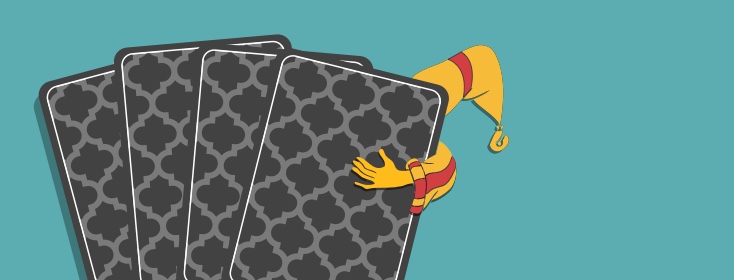The Joker in the Deck
Like thousands of other aging boomers, I’m caring full time for my elderly mother. She’s 83 now, and while she’s doing fairly well at the moment, she’s been on the poor-health rollercoaster for several years.
I first came to stay with her, temporarily, when she got sciatica, a spinal nerve problem that causes intense pain from the lower back down into one or both legs. It got worse and worse, and nothing her doctors or specialists did seemed to help. Weeks, then months, passed. Poor Mom could barely move to dress herself, let alone manage all the other aspects of daily life: showering, laundry, meals, shopping, housecleaning, etc.
While battling the sciatica, she had several urinary tract infections that knocked her down hard, and then developed heart problems that ultimately required her to have a pacemaker surgically inserted. By the time a chiropractor had finally--to our amazed relief--done away with her sciatic pain, these other ailments had become chronic or permanent. Mom became much more frail and wobbly on her feet, and while she was still amazingly sharp most of the time, her memory began to give her problems. She found keeping track of her medicines--which to take, which to discard, how much to take, when, and, importantly, why to take them--both bewildering and frustrating.
So I moved in with her and became her live-in, always-on-call caregiver. That was a little over four years ago. Now, I’m with her to the end.
I should make it clear here that I’m lucky in many ways, not least that as a professional freelance writer, I can work from wherever I am as long as I have an Internet connection (and time to cloister myself away for a while each day). My daughter and step-daughter are beautiful, competent adults, and my husband and I have amicably separated. My sister lives several states away, so while she wants to be more helpful, it just isn’t practical or affordable for her. Instead, she visits us at least four times a year and is ready to fly out anytime if we need her.
So, taking care of Mom works out well for me, and I’m very glad that I can do it. She was a great mother who loved me, encouraged me, and helped as much as she could when I was a child and a young adult. Even today she gives me more in terms of love and emotional support than she realizes--far more than I can ever hope to return.
The only joker in this deck is my rheumatoid disease.
Over the last couple of years it’s gotten a lot worse. My rheumatologist has dragged out the big guns, adding Humira (to no effect), then Enbrel to my existing cocktail of leflunomide, plaquenil, and sulfasalazine, but none of them are working very well. That means I’m coping almost daily with varying degrees of stiffness and pain. It’s primarily in my hands and feet, but the inflammation the disease causes also has painful bursitis in my hips and tendinitis in my elbows in a constant uproar. I fight with fatigue a lot now, too. That’s a new symptom for me, so I’m still learning to cope with it.
So far, none of these have prevented me from caring for Mom or myself. Our lives are relatively quiet. But because she tires so easily now--and gets even more wobbly and sometimes, dizzy when she does, I’m the do-er and go-fer of the household. We moved last fall from the large condominium high in the foothills she and my Dad bought not long before he passed away to a much smaller apartment in the suburbs of the city, so there are far fewer household chores and no yard work anymore. Thank goodness we did, as I don’t think I could have handled it all now--and while Mom was trying valiantly, she couldn’t have done it now, either. But the traffic here is much worse than she was used to dealing with, and the area is unfamiliar to her, so I drive now when either of us have doctor appointments to keep, groceries to shop for, or daily errands to run.
Rheumatoid disease forces all of us to make both big and small changes we don’t really want to make. I hope that Enbrel will start helping to slow my disease and, in turn, ease some of my pain and fatigue, but I’ve been at this game for a long time. I know that I can’t predict what tomorrow might bring. And so I worry about what will happen if RD further impairs my ability to take care of myself and my Mom. I worry about her future, and I worry about mine.
But I try not to worry too much. After all, worrying won’t change the outcome. Taking action might, though. So I’m dealing with my RD as aggressively as possible, hoping for a future in which both our wine glasses are half-full even as I ready myself to deal with life if they end up half-empty instead. Preparing for the worst keeps me optimistic about maintaining the best. And, if you hadn’t noticed, optimism helps to allay pain and depression, RD’s twin soul-killers.
I don’t know if my role as my mother’s caregiver will last for another year or for another 10. Whatever comes, I’m so thankful that I’m able to spend her last years right here at her side, laughing and enjoying life with her from the moment she wakes up in the morning until we both turn in at night. And when, inevitably, she’s gone? My life will change again. Thanks to RD, I’m already very good at that, so I’m sure I’ll get along just fine.
Community Poll
What flare symptom do you wish you could avoid the most?

Join the conversation